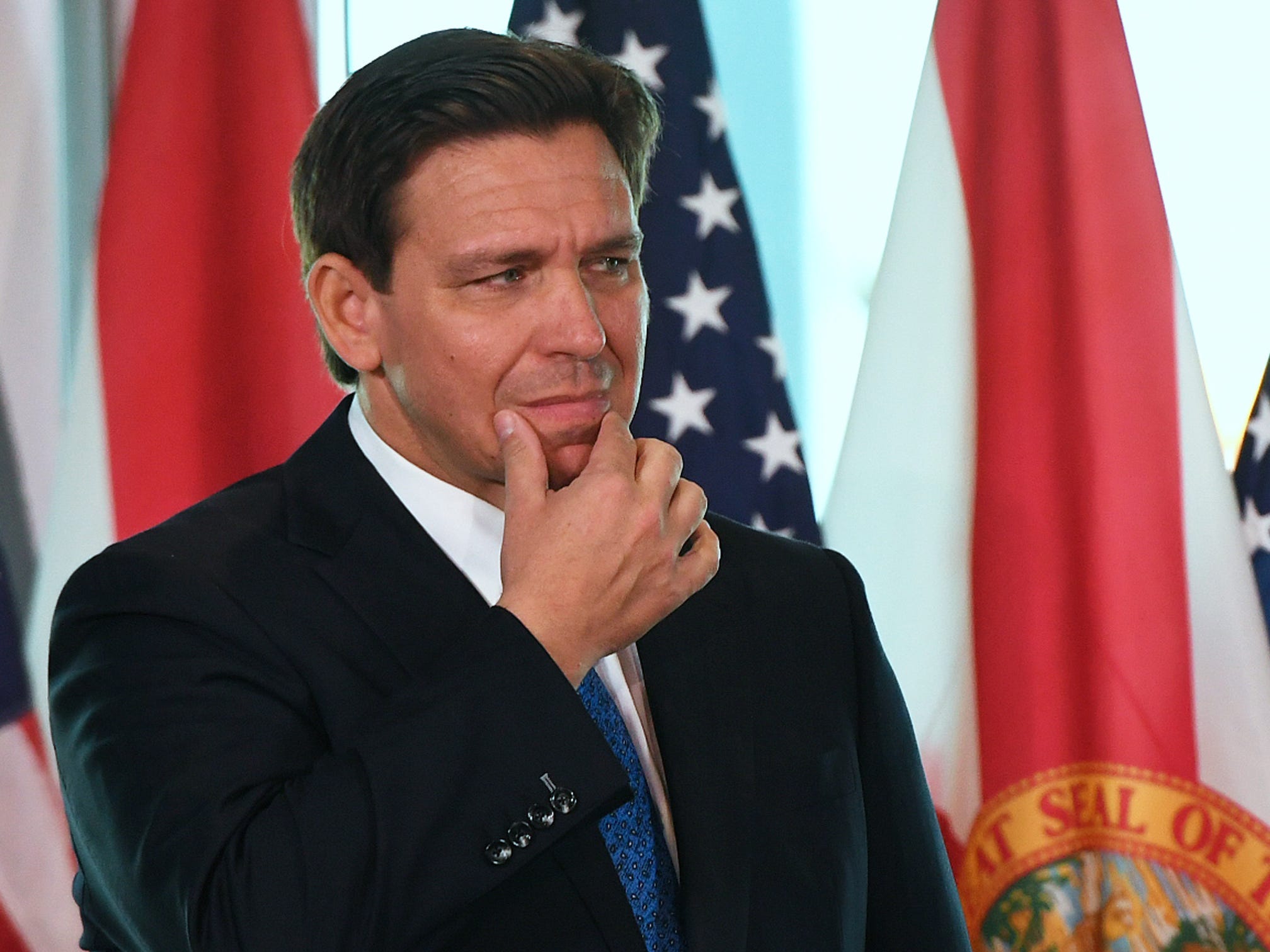- Ron DeSantis supported killing a federal mandate that is prized by the ethanol industry.
- DeSantis’ past votes are being scrutinized ahead of an expected presidential campaign.
- The ethanol industry is huge in Iowa, and Iowa is key to any Republican hoping to defeat Trump.
Thanks for signing up!
Access your favorite topics in a personalized feed while you’re on the go.
Florida Gov. Ron DeSantis’ potential bid to dethrone former President Donald Trump could hit a critical snag in Iowa, home to the first-in-the-nation caucuses.
DeSantis, like many other House conservatives, was previously opposed to a federal mandate that has helped spur domestic ethanol production. As a Floridian, he faced little to no cost for such a view.
As a now likely future presidential candidate, he will have some explaining to do.
DeSantis voting record is already a punching bag
DeSantis’ potential rivals have already begun tearing into his record. He hasn’t even announced a campaign yet.
Former President Donald Trump and President Joe Biden have made it clear that they’ll go after his votes to fundamentally change Medicare and Social Security. Former UN Ambassador Nikki Hayley, the only other major GOP candidate at the moment, blasted DeSantis for not going far enough with a parental education rights bill that critics tagged as “Don’t say gay.” While New Hampshire Gov. Chris Sununu went after the Floridian for targeting private businesses, a likely nod to Florida’s efforts to punish Disney after the company criticized the parental rights bill.
But primaries are not won in debates; they’re won in states. One of those states is Iowa, and one bill in particular could jeopardize his fate there.
Less than a year before he announced his gubernatorial run, the then-Florida congressman co-sponsored legislation in 2017 that would have immediately ended the Renewable Fuel Standard, a mandate that requires renewable fuel to be blended into the nation’s fuel supply.
The federal mandate applies to multiple categories of biofuels, but it’s main requirements are met by corn starch ethanol. Iowa produces more corn than any other state, and a majority of that crop is processed into ethanol along with the byproducts such as livestock feed.
“If you come to Iowa, you’re going to talk about agriculture,” Monte Shaw, the executive director of the Iowa Renewable Fuels Association, told Insider. “Over 60% of Iowa’s corn crop, which is, of course the largest in the country, goes into an ethanol plant.”
The bill, written by then-Rep. Bob Goodlatte of Virginia, would have immediately ended the mandate. The mandate is not without its detractors. Some conservatives have long loathed it since it’s a government mandate on private industry, while some environmentalists question if boosting ethanol is the most environmentally sound policy.
“He was a congressman from Florida, probably hadn’t been to Iowa, probably hadn’t toured an ethanol plant, probably hadn’t talked to a whole lot of corn growers, quite frankly,” Shaw said. “Do I like the fact that this is track record? No. I don’t want anyone to dislike ethanol. Is that a deal-breaker? Hell no.”
Iowa looms large over the modern presidential primary and caucus calendar. At the very least, any candidate who wants to topple Trump will need to finish near the top in the state.
DeSantis won’t be alone in facing questions
Trump’s own administration was hammered over its handling of the renewable fuel standard. Both of Iowa’s Republican senators, Chuck Grassley and Joni Ernst, repeatedly sought to play the then-president against his EPA administrators. The Environmental Protection Agency is responsible for setting standard. The agency also fields requests from smaller oil refiners, which are allowed to ask for waivers if they can prove that the mandate is financially harmful.
“Once again, EPA is playing games and not helping President Trump with farmers. An agreement was reached on September 12 in an Oval Office meeting between several Midwest leaders, President Trump and other members of his Administration,” Grassley and Ernst said in a 2019 statement. “This does not reflect what we agreed to in that meeting.”
Shaw deemed Trump a “mixed bag.” He praised the Trump administration for moving to allow a higher-blend of ethanol to be sold at gas stations year-round. Like Iowa’s senators, he was also deeply frustrated by how Trump’s EPA enforced the renewable fuel standard.
Then again, Donald Trump did win the 2016 nomination without Iowa.
Former Secretary of State Mike Pompeo, who is weighing a 2024 campaign, may be in more hot water among Iowans.
Pompeo took a strong position against a key tax credit for wind energy during his time in Congress. Pompeo delighted in leading the struggle against the Wind Production Tax Credit, a policy so close to Grassley that the Iowa senator is often called the “father” of it. Iowa is also the nation’s second-largest producer of wind energy. The then-Kansas lawmaker took a strong philosophical stance against government support of specific renewable sources.
No state produces ethanol — or headaches for the GOP — like Iowa does
Iowa is the nation’s largest ethanol producer. Forty-one plants are based in the state, stretching all the way from Council Bluffs and the Nebraska border to the West to Muscatine and the Illinois border to the East. Last year, the Iowa Renewable Fuels Association said that the state set another record as it produced 4.5 billion barrels of ethanol. In 2021, the last year for which there is full data, the US in total produced 15 billion barrels.
The marriage between a once-nascent industry and Iowa’s raw political power is so well known that The West Wing devoted a whole episode to the question of whether aspiring presidents would shuck aside their past views for a chance to win.
Shaw said that there are many “myths” about the standard and the caucuses, rejecting that there are any sort of “kiss the ring” moments. Instead, he said his organization uses the caucuses as a tool to educate candidates.
“Believe me, I wish it was that easy, right?” he said. “It’s not what it’s like at all. The ethanol industry isn’t here because of the Iowa caucuses, we’re here because we’re the world’s cheapest source of fuel octane.”
McCain spent years ripping federal support of ethanol, including a now-expired subsidy before slightly softening his stance. As McCain would often say in the state, “I do have a glass of ethanol every morning with Chuck Grassley.”
But the era of “King Corn” may be ending.
Texas Sen. Ted Cruz was hammered for months on the campaign trail for wanting to phase out the Renewable Fuel Standard. He appeared to soften his position, though his campaign pushed back on the idea he was changing his views. Ultimately, he emerged victorious, the only Republican not named Donald Trump to win one of the four early states in 2016. He also did so without ever explicitly promising the entirety of what the biofuels industry would want.
Iowa is all about the expectations game. Media attention on the top finishers is only likely to increase amid the prospect that it will be Trump’s first time on a ballot since losing the 2020 election. Delegate allocation rules mean that no candidate is anywhere close to the nomination even if they emerge victorious, but a poor finish could doom a campaign.
For now, whether DeSantis has changed his mind since his time in Congress remains unclear. Representatives for the governor did not respond to Insider’s request for comment.




